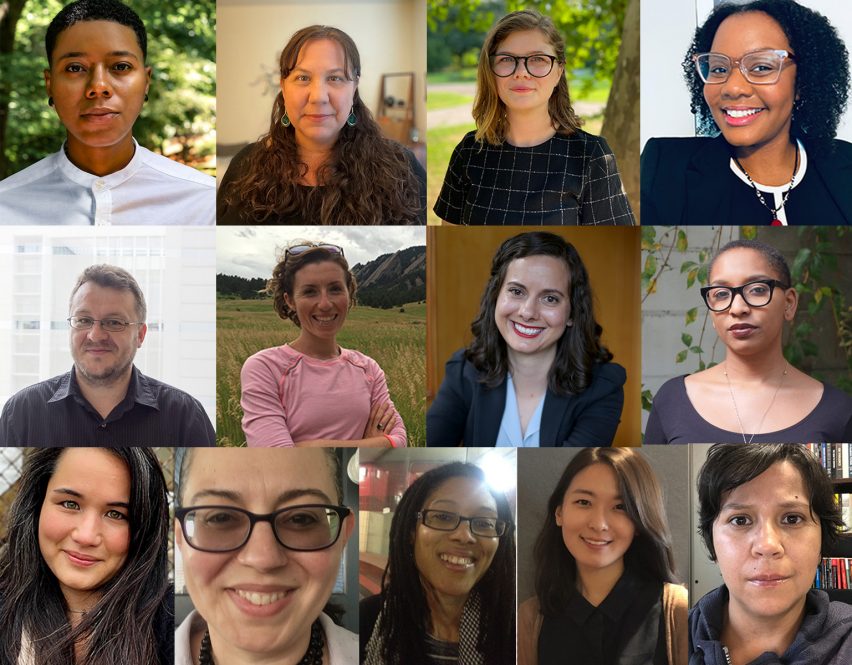New faculty join the College of Liberal Arts and Sciences (CLAS) this fall as part of two groups launched by Dean Juli Wade to increase interdisciplinary scholarship in human-environment interactions and diversity, equity, and inclusion.
Over the past year, faculty within the College collaborated to propose topic areas for the cluster hires, and two were selected in environment and human interactions, and antiracism.
“For CLAS, cluster hires have allowed us to provide tangible support for our ethical and intellectual commitments,” says Katharine Capshaw, Associate Dean for Diversity, Equity, and Inclusion in the College, and professor of English.
The new faculty members will contribute to existing research strengths in the College surrounding racial inequity and environmental issues.
“Bringing new, diverse faculty to the College benefits all UConn students, who now have access to these world experts as teachers in the classroom,” says Wade. “We can also look forward to exciting, innovative research that will advance knowledge and policy on pressing issues, including racial equity and environmental preservation.”
The two cluster areas are as follows:
The Environment and Human Interactions cluster will bring in total seven tenure-track faculty to UConn, five of which join the College this fall in the Departments of Anthropology, Chemistry, Political Science, Public Policy, and Sociology. The faculty will study how human activities are impacting a range of Earth systems, and how changes to the Earth itself are impacting society. They will actively engage with policymakers to implement solutions.
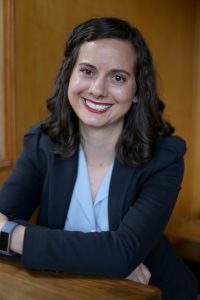
Nina Brooks joins the College as assistant professor in public policy with a focus on the intersection of environment, health, and international development policy. Brooks completed her Ph.D. in the Emmett Interdisciplinary Program in Environment and Resources at Stanford University.
Brooks employs a range of disciplinary approaches, including economics, demography, data science, geography, and epidemiology. Her current research includes developing strategies to increase adoption of energy efficiency upgrades in the brick industry in Bangladesh, examining how food security affects fertility in sub-Saharan Africa, and exploring the impacts of abortion policies on women’s health and economic outcomes.
In the classroom, she works to ensure students are comfortable understanding and tackling real-world problems.
Eleanor Shoreman-Ouimet, assistant professor of Anthropology, joins the Environment and Human Interactions cluster with a focus on environmental anthropology. With a Ph.D. from Boston University, Shoreman-Ouimet has shaped and defined the field of environmental anthropology.
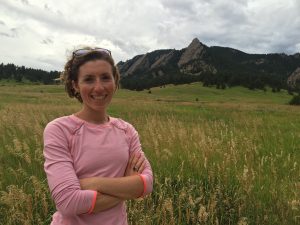
Recently, she has collaborated with the UConn School of Engineering, the Department of Geoscience, and Extension faculty to examine how ethnographic research on cultural values and belief systems can assist efforts to increase community resilience, address environmental injustices and inform engineering and policy decisions to prevent loss of life from climate change and other human/environmental disasters.
Shoreman-Ouimet’s research also examines community-based conservation efforts. She is currently working with colleagues in Anthropology, exploring grassroots efforts in a rural Colombian community to achieve environmental and economic sustainability and is the principal investigator on a project exploring racial microaggressions at UConn.

Alexander Aksenov is an incoming assistant professor in the Department of Chemistry, using mass spectrometry to explore the complexity of biological molecules and how different molecules play into health and disease.
Aksenov earned his Ph.D. in Chemistry from the University of Florida and completed postdoctoral training in mass spectrometry at Carnegie Mellon University. After a year as a senior research scientist in the United Kingdom, he joined the University of California Davis Mechanical and Aerospace Department Bioinstrumentation and BioMEMS laboratory.
Since 2016 he has worked as a project scientist at the University of California, San Diego. As an educator, Aksenov believes in providing students with thought-provoking questions; giving them interactive, hands-on experiments; and directing them toward the resources to discover their own answers.
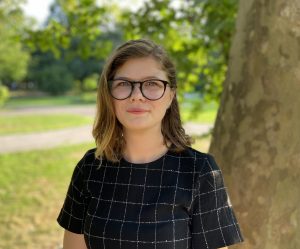
Talbot Andrews joins the College as assistant professor of political science, specializing in environmental policy and climate change attitudes. With a Ph.D. in political science from Stony Brook University in New York, Andrews integrates meteorological and public opinion data to study responses to climate change in the United States.
Prior to joining UConn, Andrews worked as a postdoctoral research associate at Princeton University, where she used survey and experimental methods to examine how impatience and other time issues affect policy preferences. She is also part of an interdisciplinary team studying the determinants of climate change literacy across Africa.
At UConn, Andrews will be teaching courses on environmental policy, public opinion, and quantitative analysis.
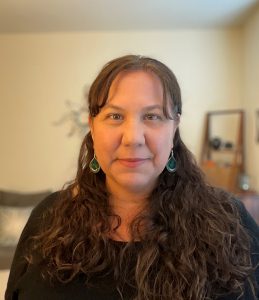
Carla Dhillon is an incoming assistant professor in sociology. With a Ph.D. from the University of Michigan, Dhillon’s research bridges environmental sociology, decolonial studies, climate change, and social dimensions of science and technology.
Dhillon examines pathways that aim to transform inequalities in environmental science practices. Her recent projects focus on the politics of cross-cultural climate change partnerships between Indigenous and non-Indigenous parties, and on community-oriented science in environmental health and justice movements. Also a licensed civil engineer, Dhillon previously worked as a structural and sustainable building designer.
As an educator, Dhillon emphasizes critical social analysis applied to environmental challenges. Her approach highlights voices and actions by those often excluded from formal environmental fields.
The Antiracism cluster brings eight faculty in departments across the humanities and social sciences, all jointly appointed with an institute or program focusing on race, gender, sexuality, and/or ethnicity. From searches framed through the concepts of Catalyzing Antiracist and Decolonial Futures and Racial Justice, the faculty are joining the Departments of English; Political Science; Philosophy; Journalism; Literatures, Cultures, and Languages; History; and Communication. Their research will focus on centralizing Black, Latinx, Asian and Asian American, and Indigenous voices in the humanities and social sciences and on building transdisciplinary research.
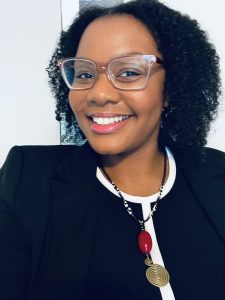
Ayanna De’Vante Spencer is an incoming assistant professor in philosophy jointly appointed with Women’s, Gender, and Sexuality Studies, with a Ph.D. from Michigan State University. As a survivor-scholar and Black feminist epistemologist, Spencer’s research weaves Black feminist theory, epistemology, sexual violence literature, settler colonial studies, and feminist anti-carceral studies.
Through her work with Girls for Gender Equity, the Firecracker Foundation, and the ‘MeToo’ Movement, Spencer saw first-hand a problematic intersection between criminalization, how Black girl sexual violence survivors are expected to respond to violence, and how the state determines what they know about their own experience(s) of violence. Her research examines structures of knowledge verification that contribute to what is called the “sexual abuse to prison pipeline.” Spencer has long focused on gendered anti-Black racism and state violence, including her noteworthy ‘Say Her Name’ chapter published in The Bloomsbury Companion to Analytic Feminism (2018).
As a first-generation college graduate and former UNCF/Mellon Mays fellow, Spencer is committed to equity and inclusion in her classes and is a strong proponent of undergraduate research.
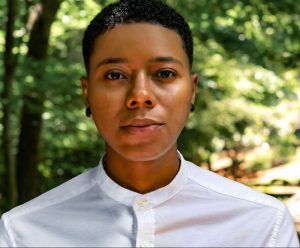
Briona Simone Jones joins the College as an assistant professor in English jointly appointed with Women’s, Gender, and Sexuality Studies, specializing in African American literature, feminist and queer theory, and Black queer studies.
With a Ph.D. in English and Certificate in Women’s and Gender Studies from Michigan State University, Jones has published a collection of Black Lesbian writings titled Mouths of Rain: An Anthology of Black Lesbian Thought, the most comprehensive anthology centering Black Lesbian thought to date. During her research, Jones developed the concept of “Black Lesbian Aesthetics” to describe the shift in self-definition that transpired after the groundbreaking formation of the Combahee River Collective of Black lesbian activists in 1974.
Jones’s teaching philosophy includes centering the knowledge and experiences of Black, Indigenous, and Queer people of color and other underrepresented students.
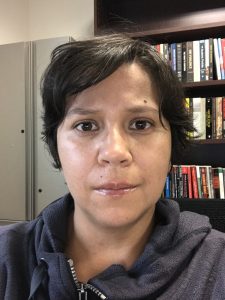
Elva Orozco Mendoza joins the College as assistant professor in political science jointly appointed with Women’s, Gender, and Sexuality Studies, specializing in political theory and Latin American politics. With a Ph.D. from the University of Massachusetts, Amherst, she was an assistant professor of political science at Texas Christian University before joining UConn.
Orozco Mendoza’s research draws on decolonial feminist thought, critical contract theory, comparative political theory, and feminist analyses on maternal activism in Latin America and contributes to several fields, including decolonial approaches to political theory, protest politics, and femicide studies. She conducted research in Northern Mexico in 2012 and 2013 to examine anti-feminicide activism, maternal political action, and citizenship. Orozco Mendoza is currently working on a book tentatively titled The Maternal Contract: A Decolonial Approach to Subaltern Justice in the Americas.
In the classroom, Orozco Mendoza incorporates authors and texts from the global south in conversation with the western canon to encourage students to develop a global perspective and be able to think across histories and experiences.
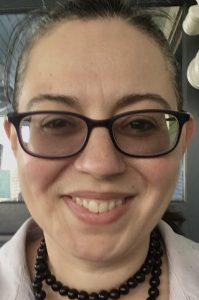
Katerina Gonzalez Seligmann, who has Cuban, Colombian, and Jewish heritage, is an incoming associate professor in the department of Literatures, Cultures, and Languages and is jointly appointed with El Instituto. With a Ph.D. in comparative literature from Brown University and a focus on Caribbean literature and thought, they previously served as assistant professor of literature at Emerson College since 2015.
Working at the intersection of literature, history, and social theory, Gonzalez Seligmann recently published a book titled Writing the Caribbean in Magazine Time that profiles the central role of Caribbean literary magazines in contributing to frameworks of decolonization. They received a Career Enhancement Fellowship in 2018 and a Ford Fellowship in 2013. They also regularly translate Cuban literature and collaborate with researchers at the École normale superieure in Paris.
In 2017, KGS, as they are known to students, won the Helaine and Stanley Miller Award for Outstanding Teaching.
Erika Williams joins the College as associate professor of English and Africana Studies. With a Ph.D. in Comparative
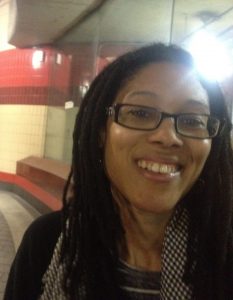
Literature and Literary Theory from the University of Pennsylvania, Williams taught at Emerson College for 15 years, specializing in 20th- and 21st-century African American and Afro-Diasporic literature and culture.
At Emerson, Williams served on the Honors Advisory Council, the Diversity Review Committee, and the Council for Inclusive Excellence, where she worked to further diversity, equity, and inclusion within the Marlboro Institute for Liberal Arts and Interdisciplinary Studies and in the college overall.
Williams has published her work in such venues as African American Literature, Modern Fiction Studies, and Studies in American Fiction, and presented it to associations including the American Literature Association, the American Comparative Literature Association, and the Modern Language Association. Her essay “A Lie of Omission: Plagiarism in Nella Larsen’s Quicksand” received African American Review’s Joe Weixlmann Award for Best Essay in Twentieth- and Twenty-first- Century African American or Pan-African Literature and Culture. She recently completed a scholarly monograph of literary and cultural criticism entitled “Tales from Du Bois: The Queer Intimacy of Cross-Caste Romance,” slated to be released in 2022.
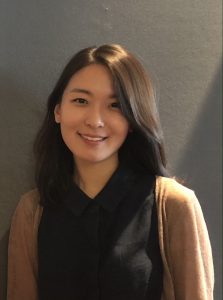
Jiyoun Suk joins the College as assistant professor in communication jointly appointed in Women’s, Gender, and Sexuality Studies, specializing in big data and diversity. With a Ph.D. in journalism and mass communication from the University of Wisconsin-Madison, Suk uses computational approaches such as natural language processing, social network analysis and machine learning to examine how communication processes in the hybrid media environment influence civic trust and activism.
Recently, Suk led a team of researchers examining how the narratives of sharing trauma and showing solidarity supported and sustained nascent #MeToo activism on Twitter. Through her research, Suk seeks to enhance people’s understanding of diverse populations and attitudes toward them.
In the classroom, Suk developed four core values she emphasizes when teaching: learning within and outside the classroom, learning through interactions, building a vibrant intellectual community and building empathy.
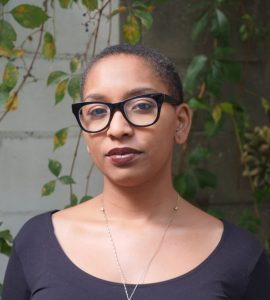
Martine Granby will be assistant professor of journalism jointly appointed with Africana Studies, with a focus on antiracism documentary journalism. She holds a master’s degree from the Medill School of Journalism at Northwestern University.
Granby most recently served as assistant professor at The New School in New York City, where she taught ethics and the history of journalism. She also worked as producer of workshops and labs at UnionDocs, where she developed non-fiction media programming and centered underrepresented voices within the filmmaking community. As a fellow with Kartemquin Films’ Diverse Voices in Docs program, she started production on her current film THE MASK THAT GRINS AND LIES, a documentary feature unveiling a triptych portrait of intergenerational silence and the stigma shrouding Black women’s mental health.
In the classroom, Granby creates a space in which students shape, share, and strengthen their journalistic voices by providing technical training, challenging critiques, and a broad sampling of media to learn from.
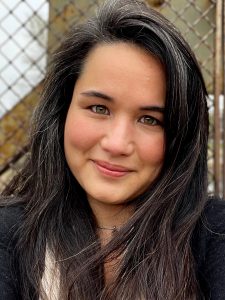
Hana Maruyama is an incoming assistant professor in history and Asian and Asian American Studies, specializing in digital public history, with a Ph.D. in American studies from the University of Minnesota, Twin Cities. Her work challenges scholars to deepen engagements with American Indian and Indigenous Studies methodologies beyond settler colonial studies by centering Indigenous people. In addition to her academic research, she co-produced the podcast Campu and worked as a research fellow for EO9066, a podcast on Japanese American Incarceration produced by American Public Media.
Prior to her graduate studies, Maruyama led the social media strategy for Heart Mountain Interpretive Center and worked as a multimedia producer for the Smithsonian Asian Pacific American Center.
As a professor, Maruyama is committed to helping students who are underrepresented in higher education by honoring different experiences while acknowledging how oppressions build on one another.
